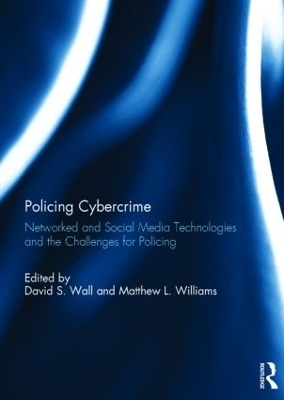
Policing Cybercrime
Routledge (Verlag)
978-1-138-02527-1 (ISBN)
This book was originally published as a special issue of Policing and Society.
Cybercrime has recently experienced an ascending position in national security agendas world-wide. It has become part of the National Security Strategies of a growing number of countries, becoming a Tier One threat, above organised crime and fraud generally. Furthermore, new techno-social developments in social network media suggest that cyber-threats will continue to increase. This collection addresses the recent 'inertia' in both critical thinking and the empirical study of cybercrime and policing by adding to the literature seven interdisciplinary and critical chapters on various issues relating to the new generation of cybercrimes currently being experienced. The chapters illustrate that cybercrimes are changing in two significant ways that are asymmetrical. On the one hand cybercrime is becoming increasingly professionalised, resulting in ’specialists’ that perform complex and sophisticated attacks on computer systems and human users. On the other, the ‘hyper-connectivity’ brought about by the exponential growth in social media users has opened up opportunities to ‘non-specialist’ citizens to organise and communicate in ways that facilitate crimes on and offline. While largely distinct, these developments pose equally contrasting challenges for policing which this book addresses.
This book was originally published as a special issue of Policing and Society.
David S. Wall researches and teaches cybercrime, identity crime, policing and intellectual property crime (counterfeits) at Durham University, UK. He has published books and articles and on these subjects and he also advises government departments and other bodies on aspects relating to these issues. He has a sustained track record of funded research in these areas for the EU FP6 & FP7, ESRC, EPSRC, AHRC & others. Matthew L. Williams researches and teaches Cybercrime, Cybersecurity, Digital Social Research Methodology and Sexuality and Criminal Justice at Cardiff University, UK. He has published a range of books and articles on these subjects. He has a sustained track record of funding in these areas from the ESRC, EPSRC, EADS and JISC and also advises government departments and other bodies on aspects relating to these issues.
Introduction: Policing cybercrime: networked and social media technologies and the challenges for policing David S. Wall and Matthew L. Williams 1. Reading the riots: what were the police doing on Twitter? Rob Procter, Jeremy Crump, Susanne Karstedt, Alex Voss and Marta Cantijoch 2. Policing identity crimes David S. Wall 3. Policing cyber-neighbourhoods: tension monitoring and social media networks Matthew L. Williams, Adam Edwards, William Housley, Peter Burnap, Omer Rana, Nick Avis, Jeffrey Morgan and Luke Sloan 4. The policing of Internet sex offences: pluralised governance versus hierarchies of standing Majid Yar 5. Policing Internet fraud in Saudi Arabia: expressive gestures or adaptive strategies? Abdullah Faze Algarni 6. Trust among cybercriminals? Carding forums, uncertainty and implications for policing Michael Yip, Craig Webber and Nigel Shadbolt 7. Formal and informal modalities for policing cybercrime across the Taiwan Strait Lennon Y.C. Chang
| Erscheint lt. Verlag | 9.5.2014 |
|---|---|
| Zusatzinfo | 5 Line drawings, black and white; 3 Halftones, black and white |
| Verlagsort | London |
| Sprache | englisch |
| Maße | 174 x 246 mm |
| Gewicht | 420 g |
| Themenwelt | Informatik ► Netzwerke ► Sicherheit / Firewall |
| Recht / Steuern ► Strafrecht ► Kriminologie | |
| Sozialwissenschaften ► Kommunikation / Medien | |
| Sozialwissenschaften ► Soziologie | |
| ISBN-10 | 1-138-02527-5 / 1138025275 |
| ISBN-13 | 978-1-138-02527-1 / 9781138025271 |
| Zustand | Neuware |
| Haben Sie eine Frage zum Produkt? |
aus dem Bereich


